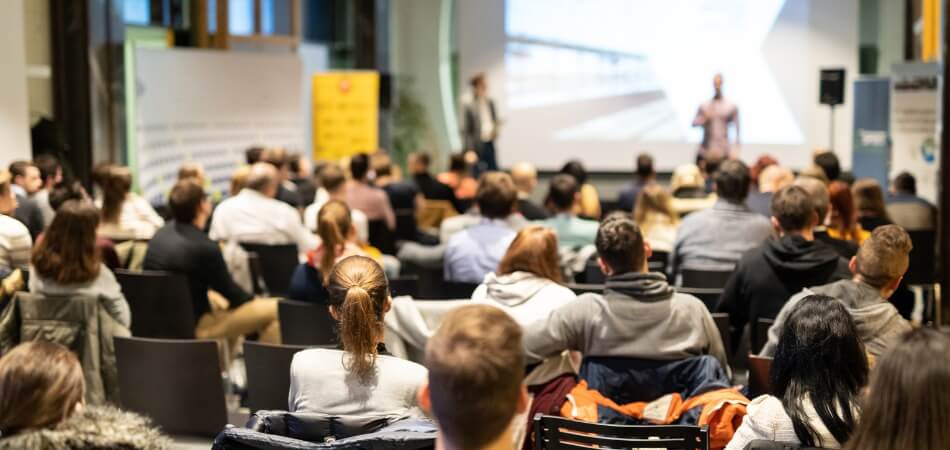Economics conferences serve as dynamic intellectual forums where a wide spectrum of topics central to the economic field are explored. These events are like bustling hubs where economists, government officials, and researchers share ideas to make our economy better. But, what topics are typically covered in economics conferences?
The answer is straightforward: economics conferences cover a wide range of topics and issues related to the field of economics. The specific topics covered can vary depending on the focus and theme of the conference.
We’ll cover big and small economics, data analysis, government finances, global economics, jobs, and pay, nature and money, finance, how people make money choices, the history of money, and money rules. These topics make economics conferences exciting for new ideas and teamwork in a changing economic world.
Concept of Economics Conference
Economics conferences are vital gatherings where experts, policymakers, and scholars convene to discuss economic issues and advancements. These events facilitate knowledge exchange and influence policy decisions, playing a significant role in shaping the economic landscape.
These conferences have evolved over time, from informal gatherings of economic thinkers to large-scale, technology-driven events. For example, an Economics Conference in Canada often features cutting-edge research and discussions on global economic trends, attracting a diverse range of participants.
They can be categorized into academic, policy, industry, and international conferences, each with its distinct focus and objectives. Typically, economics conferences include components like keynote speeches, research paper presentations, panel discussions, and networking opportunities.
They cover a wide range of topics, including macroeconomics, microeconomics, econometrics, and various specialized fields. The diverse audience comprises economists, policymakers, industry professionals, and students, contributing to rich and impactful discussions that drive economic progress and innovation.
What Topics Are Typically Covered in Economics Conferences?
Economics conferences are dynamic events where experts, researchers, policymakers, and industry professionals come together to delve into a broad range of topics that shape the economic world. Knowing what topics are typically covered in economics conferences can provide valuable insights into the latest research, economic theories, and practical solutions discussed.
These conferences provide a platform for discussing the latest research, debating economic theories, and exploring practical solutions to pressing issues. Here’s a detailed look at the various topics typically covered.
1. Macroeconomics
Macroeconomics examines the economy as a whole, focusing on broad phenomena such as inflation, unemployment, and economic growth. At conferences, you might encounter discussions on:
Economic Growth Theories: Exploring factors that drive long-term growth and how policies can influence these factors.
Monetary Policy: Evaluating central bank actions, interest rates, and their impacts on the economy.
Fiscal Policy: Analyzing government spending and tax policies and their effects on national and global economies.
2. Microeconomics
Microeconomics zeroes in on individual and business-level decisions, including:
Consumer Behavior: Understanding how individuals make decisions regarding spending, saving, and investing.
Market Structures: Examining different types of market environments, such as perfect competition, monopoly, and oligopoly.
Labor Economics: Studying employment patterns, wage determination, and labor market policies.
3. Econometrics
Econometrics combines statistical methods with economic theory to analyze data and test hypotheses. Key topics include:
Statistical Modeling: Using various models to interpret economic data and predict future trends.
Data Analysis Techniques: Employing tools like regression analysis and time-series analysis to understand economic phenomena.
Policy Evaluation: Assessing the effectiveness of economic policies using empirical evidence.
4. Development Economics
Development economics focuses on improving economic conditions in developing countries and includes:
Poverty and Inequality: Investigating causes of poverty and income disparities and strategies to address them.
Sustainable Development: Exploring methods for achieving economic growth while preserving environmental resources.
Economic Policy in Developing Nations: Discussing policies tailored to the unique challenges faced by developing economies.
5. International Economics
International economics examines economic interactions between countries, covering:
Trade Theory and Policy: Analyzing trade agreements, tariffs, and their impacts on global trade.
Exchange Rates and Currency Markets: Understanding how currency fluctuations affect international trade and investment.
Globalization: Evaluating the benefits and drawbacks of global economic integration and its effects on local economies.
When attending an international economics conference, understanding these topics can be crucial for insightful discussions. Also, keeping in mind the proper conference attire for economics ensures that you make a professional impression while engaging in these complex discussions.
6. Behavioral Economics
Behavioral economics studies how psychological factors influence economic decisions, including:
Decision-Making Processes: Exploring how biases and heuristics affect choices and market outcomes.
Consumer Psychology: Investigating how emotions and cognitive biases impact spending and saving behavior.
Policy Implications: Designing interventions that account for human behavior to improve economic outcomes.
7. Financial Economics
Financial economics focuses on financial markets and instruments, covering topics such as:
Asset Pricing: Analyzing how financial assets are valued and the factors that influence their prices.
Risk Management: Exploring techniques for managing and mitigating financial risks.
Corporate Finance: Studying how firms make investment decisions and manage capital.
8. Public Economics
Public economics examines the role of the government in the economy, including:
Taxation: Analyzing different tax systems and their effects on economic behavior and equity.
Public Spending: Evaluating government expenditures and their impact on economic growth and welfare.
Welfare Economics: Assessing policies aimed at improving social welfare and reducing inequality.
9. Health Economics
Health economics looks at how economic principles apply to healthcare systems, including:
Healthcare Financing: Exploring different models for funding and delivering healthcare services.
Cost-Effectiveness Analysis: Evaluating the efficiency of healthcare interventions and treatments.
Policy Implications: Discussing strategies to improve healthcare access and outcomes.
10. Environmental Economics
Environmental economics deals with the relationship between the economy and the environment, including:
Climate Change Economics: Analyzing the economic impacts of climate change and strategies for mitigation and adaptation.
Resource Management: Studying the sustainable use of natural resources and environmental conservation.
Environmental Policy: Evaluating policies aimed at reducing pollution and promoting sustainability.
These topics provide a comprehensive overview of what you can expect at economics conferences. They reflect the diverse and evolving nature of the field, offering insights into both theoretical and practical aspects of economics.
Whether you are a researcher, policymaker, or industry professional, these conferences are valuable for staying informed and contributing to the ongoing dialogue that shapes economic understanding and policy.
The Role of Economics Conferences
Economics conferences play a crucial role in shaping the economic landscape. These gatherings provide a platform for experts, policymakers, and scholars to share insights, exchange ideas, and collaboratively address complex economic challenges.
- Firstly: Economics conferences foster knowledge exchange. They enable experts from diverse fields of economics to present their research findings, cutting-edge theories, and practical solutions. This exchange of knowledge stimulates intellectual growth and innovation in the field.
- Secondly: These conferences have a significant impact on economic policies. Policymakers often attend these events to gain insights into the latest economic trends and research. The discussions and recommendations generated at these conferences can influence government decisions, leading to the formulation of more informed and effective economic policies.
- Lastly: economics conferences encourage collaboration. They provide opportunities for networking, establishing partnerships, and engaging in interdisciplinary discussions. These interactions can lead to joint research projects, policy initiatives, and a deeper understanding of economic challenges from various perspectives.
Economics conferences serve as vital platforms for knowledge dissemination, policy influence, and collaborative efforts. They contribute to the ongoing development of the field and play a crucial role in addressing the ever-evolving economic landscape.
Benefits of Participating in Economics Conference
Economics conferences provide a unique opportunity for individuals in the field to engage with the latest developments, collaborate with peers, and broaden their horizons. Here, we explore the substantial advantages of participating in these dynamic events.
Knowledge Enhancement
These conferences feature presentations from leading experts who share the latest research, trends, and insights. Attendees gain access to cutting-edge knowledge and innovative solutions that might not yet be available in publications or online.
By participating, individuals stay updated on current issues and advancements in economics, enriching their understanding and expertise. Additionally, presenting research at economics conferences allows participants to showcase their work, receive constructive feedback, and contribute to the broader academic discourse.
Networking Opportunities
Economics conferences bring together professionals, academics, policymakers, and industry leaders from diverse backgrounds. This unique mix provides ample opportunities for networking.
Attendees can build valuable connections, collaborate on research, or even explore potential job prospects. Engaging with peers and experts in the field helps broaden one’s professional network, often leading to new partnerships and career growth.
Skill Development
Workshops and interactive sessions are common at economics conferences. These sessions offer hands-on experience and practical skills, such as data analysis techniques or policy evaluation methods.
Learning directly from experts in a collaborative environment enhances practical skills and deepens theoretical knowledge, which can be immediately applied to one’s own work.
Research Presentation
Presenting one’s research at a conference provides a platform for receiving constructive feedback, refining research skills, and gaining recognition within the academic and professional community.
Exposure to Diverse Perspectives
Attending conferences allows individuals to hear a variety of perspectives on economic issues. This exposure to different viewpoints and approaches fosters a more comprehensive understanding of complex topics.
Engaging with diverse opinions can spark new ideas and strategies, contributing to a more well-rounded approach to economic problems.
Policy Influence
Engaging with policymakers and government officials at conferences provides a unique opportunity to contribute to policy discussions. Attendees can offer insights and data-driven recommendations, potentially influencing economic policies.
Professional Development
Presenting at a conference, whether as a speaker or panelist, provides valuable experience in public speaking and presenting research. It also boosts one’s professional profile and can lead to recognition within the field. For many, these experiences are crucial for career advancement and academic progression.
Inspiration and Innovation
Being surrounded by passionate professionals and cutting-edge research often sparks inspiration. Attendees leave conferences with renewed motivation and innovative ideas, which can drive future projects and research endeavors.
Participating in an economics conference not only expands knowledge and professional connections but also enhances skills and provides fresh perspectives. It’s an investment in one’s career and personal growth, making it a valuable experience for anyone in the field.
Frequently Asked Questions
Do economics conferences cover topics related to global economic trends?
Yes, economics conferences often cover global economic trends. These events explore issues like international trade, economic growth, and market fluctuations. By focusing on worldwide trends, attendees gain valuable insights into how economies are interconnected and the impacts of policies, innovation, and market shifts on a global scale.
What role does behavioral economics play in economics conference discussions?
Behavioral economics plays a key role in economics conference discussions by exploring how human behavior and psychology influence economic decisions. It helps attendees understand why people make irrational choices and how these insights can improve policies, business strategies, and financial models to better reflect real-world behaviors.
Do economics conferences focus on specific industries or sectors?
Yes, economics conferences often focus on specific industries or sectors. They may explore topics like healthcare economics, financial markets, technology, and environmental sustainability. These specialized discussions help professionals and policymakers understand industry trends, challenges, and opportunities, making the conferences highly relevant to specific fields.
Can students present or engage in discussions on topics at economics conferences?
Yes, students can present and engage in discussions at economics conferences. Many conferences offer opportunities for students to present research, participate in panel discussions, and network with professionals. It’s a great way to share ideas, gain feedback, and expand their understanding of key economic topics.
How do economists at conferences approach the topic of inequality and economic disparity?
At conferences, economists tackle inequality and economic disparity by exploring causes like income gaps, unequal access to resources, and wealth distribution. They discuss potential solutions, such as policy changes, education access, and social welfare programs, to promote fairness and reduce economic divides across communities.
Conclusion
Economics conferences are like energetic gatherings where experts, policymakers, and scholars meet up to discuss and shape the world of economics. They talk about various topics, from big economic ideas to how people make money choices. These events are also great for learning, making friends, and sharing research.
Besides expanding knowledge, conferences help with networking, which means meeting new people who can become friends or work partners. They’re also a chance to show off your research and get helpful feedback. You’ll hear different viewpoints from people worldwide, which can help you understand global economic problems better.
So, when someone asks, “What topics are typically covered in economics conferences?” you can tell them it’s a mix of many ideas and discussions, making economics conferences exciting and essential for anyone interested in the field.








